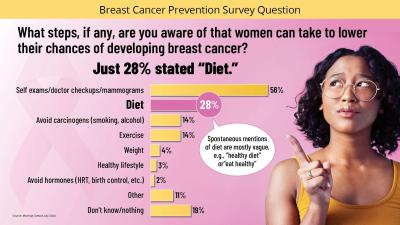Five Nutritious Essentials To Reduce Breast Cancer Risk

Eating a plant-based diet can reduce your risk for breast cancer and help stop recurrence.
Whole plant foods like fruits, vegetables, whole grains, and beans help maintain healthy hormone levels, while phytonutrients, the naturally occurring chemicals in plants, can contribute to fighting cancer. Here are five breast health essentials to add to your next grocery shopping trip.
1. Fiber
Several studies show that the more high-fiber, vitamin- and mineral-packed foods women consume, the lower their cancer risk.
A recent study published by the American Cancer Society found that women who ate lots of fiber were less likely to get breast cancer. Soluble fiber from grains, fruit, beans, lentils, and vegetables appeared protective, with the strongest link coming from fiber from fruit.
2. Soy
Research shows that women who consume soy are less likely to get breast cancer. One study found that women averaging one cup of soy milk daily have a 30% lower risk of developing breast cancer compared with women who eat little or no soy.
This may be due to protective substances called isoflavones found in soy foods. Soy isoflavones help to keep estrogen signaling at healthy levels. Estrogen works by binding to “docking sites,” or receptors, on cells. Sometimes, when estrogen attaches to its receptor, it can trigger certain cancer cells to grow. To our bodies, soy isoflavones resemble estrogen, which allows them to bind to these receptors, effectively blocking the cell growth that is part of the cancer process.
Studies found that eating soy foods during the preteen and teen years, when breast tissue is forming, may be especially protective. It also can help lower the risk of reoccurrence in those who have already had breast cancer.
3. Phytonutrients
Certain phytonutrients, like carotenoids, have been shown to reduce the risk for breast cancer. In the Nurses’ Health Study, vegetables with high concentrations of carotenoids were associated with an 18%-28% lower risk of breast cancer and inversely associated with breast cancer recurrence and mortality from this disease, over a follow-up period of 20 years.
Women who consumed foods high in vitamin C and carotenoids saw a lower risk for breast cancer. Foods rich in Vitamin C and carotenoids include citrus fruits, leafy greens, and carrots. Carrots also contain high levels of beta-carotene, a carotenoid and cancer-fighting antioxidant found in orange and red fruits and vegetables. Beta-carotene protects the body from free radicals, which can damage the cells and lead to cancer and other chronic illnesses.
Don’t forget the cruciferous vegetables! Arugula, Brussels sprouts, and cauliflower are packed with phytochemicals called indoles and isothiocyanates, which can help reduce breast cancer risk by decreasing the production of “bad” estrogen (16-alpha-OHE) while increasing levels of “good” estrogen (2-OHE).
4. Plant-Based Protein
Choose healthy, plant-based protein like beans, nuts, and tofu. Tofu is not only great as a protein source, but about one half cup daily is enough soy to lower your risk for breast cancer by 30%!
Hot dogs, bacon, sausage, and lunch meats have been linked to a higher risk of breast cancer. A study of more than 200,000 women found that eating about 20 grams of processed meat each day—less than half the size of a regular hot dog—increased breast cancer risk by 21%.
Bonus! Switching from animal products to a diet rich in plant-based protein sources will save you money on your grocery’s receipt!
5. Plant-Based Milks
Higher intakes of cow’s milk may be associated with an increased risk for breast cancer. Cheese has been shown to increase risk by 53%! Components in dairy such as insulin-like growth factor (IGF-1) and other growth hormones may be among the reasons for the increased risk for cancer.
Ditch the dairy and switch to plant-based milks, like soy, almond, oat, hemp, or flax milk. A study found that women who regularly consumed soy products like soy milk were about a third less likely to have their breast cancer return, and 29% less likely to die from cancer compared with women who ate little soy.
Make the switch to a plant-based diet to reduce your risk. Learn more about how a plant-based diet can fight back at LetBeatBreastCancer.org.








